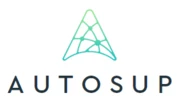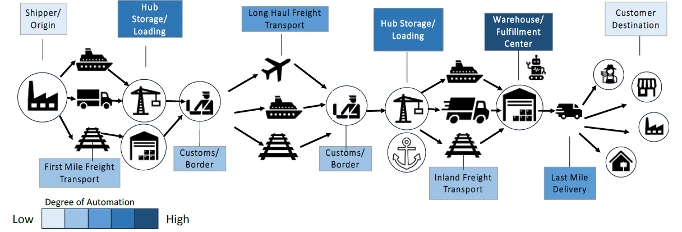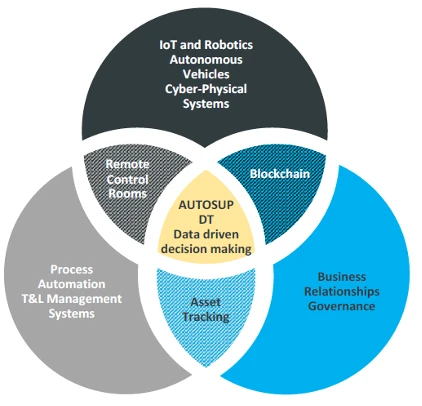
AUTOSUP - Preparing the ground for AUTOnomous multimodal SUPply chains
About
AUTOSUP is a research & innovation project funded under the Horizon Europe programme. Its objective is to develop multimodal automatic freight transport concepts and solutions to enhance the operation of hubs as nodes in a Physical Internet (PI) logistics network.
Nowadays, the European freight transport and logistics (T&L) industry is on the verge of transformational shifts, fueled by digitalisation and technology innovations, presenting prospects for new business models and zero-emission freight transport. Simultaneously, it is facing significant operational efficiency challenges, isolated implementations with lack of interoperability, insufficient multimodal collaboration, regulatory gaps and operational discontinuities. A new comprehensive strategy guiding the integration of automation technologies for the T&L sector is therefore of paramount importance.
The AUTOSUP project will address these challenges and support the smooth advancement of automation levels in multimodal hubs and terminals. These are key nodes in the logistics networks whose role and functionality determine the efficiency and environmental impact of the whole PI network. In that regard, AUTOSUP will advance the following 3 autonomy factors:
the level of automation integrated into its operations (hub level),
the level of connectivity (physical transport infrastructures like roads and ICT communications’ connectivity), operations’ digitisation and information sharing,
the level of their operational interconnection (from a collaboration perspective) with other nodes (network level).
Main project objectives are:
Define automation requirements for seamless multimodal automatic freight transport
Empower T&L stakeholders with an open, ready-to-use DSS and customisable DT model of autonomous SCs, to help them implement and deploy automated processes and solutions for logistics and multimodal freight transport.
Design new operational, governance and organisational change management models for autonomous SCs logistics that incentivise cross-mode collaboration and reduce investment costs.
Validate operational and cost efficiencies of solutions and evaluate user acceptance in two multimodal Living Hubs via feasibility analysis, impact assessment and the engagement of representative stakeholder communities.
Establish a strategic and cohesive alliance and thematic working group (TG) for the alignment of multimodal automation adoption roadmaps across rail, road, aviation, waterborne and alternative innovative modes of transport.
To fulfil these objectives, AUTOSUP will identify the strain points, improve the links between nodes and hubs and will run alternative simulation scenarios towards identifying the parameters that optimise the operations of the network considering technological, operational, regulatory and governance aspects. This will be achieved through the development of Digital Twin (DT) models of automated Supply Chains (SC), integrated in an open, ready-to-use data-driven Decision Support System (DSS).
TUM’s role in the project
TUM’s contribution to the AUTOSUP project primarily focuses on: identifying data exchange systems and information flows’ mapping for freight automation solutions; defining functional and technical requirements to ensure compliance with industry standards and promote interoperability; developing technology acceptance models for freight automation solutions proposed in the project L-Hubs and providing guidance to operational automation techniques to enhance automation outcomes. TUM will coordinate activities with other project tasks to ensure seamless integration of analytical outputs with digital twins, knowledge graphs, and L-Hub use-case implementations.
Partners

Contact
Prof. Dr. Constantinos Antoniou, Dr. Arkadiusz Drabicki, Filippos Adamidis, Dr. Ramandeep Singh

